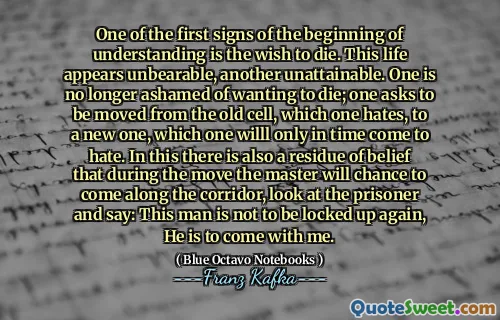It is only our conception of time that makes us call the Last Judgment by this name. It is, in fact, a kind of martial law.
Franz Kafka suggests that our understanding of time shapes how we perceive events like the Last Judgment. Instead of viewing it as a temporal event, he proposes that it resembles martial law, indicating a state of emergency or strict order. This perspective invites a reconsideration of how we interpret significant moments, reflecting on the implications of authority and judgement beyond mere chronology.
Kafka's view challenges the conventional connotations tied to the Last Judgment, urging readers to think deeper about the nature of justice and accountability. By likening it to martial law, he highlights themes of power and control, suggesting that such moments in life may be more about immediate realities and societal structures than about time passing in a linear fashion.






